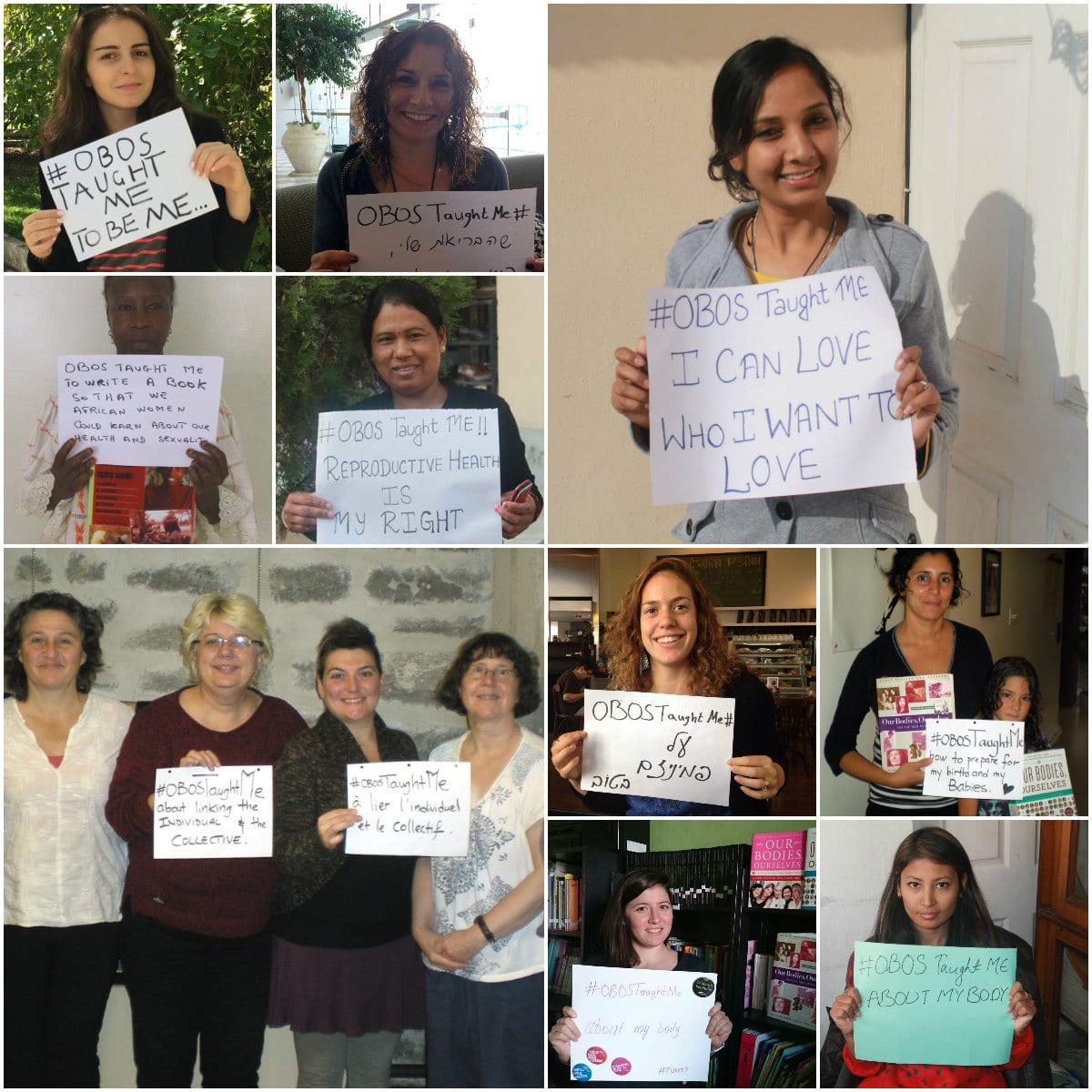Building a Global Community to Advance Women's Health and Human Rights
 OBOS Global Initiative Program Director Sally Whelan and Program Manager Ayesha Chatterjee in 2015.
OBOS Global Initiative Program Director Sally Whelan and Program Manager Ayesha Chatterjee in 2015.
By Ayesha Chatterjee — November 30, 2015
I have been with Our Bodies Ourselves since 2006, co-piloting OBOS’s Global Initiative with Sally Whelan, one of the organization’s founders. My connection to the group goes back further, to 2001, when I joined a small, sassy and super-radical group of women in Delhi, India, to provide information on sexuality and reproductive health via the TARSHI (Talking About Reproductive and Sexual Health Issues) helpline. This was no easy feat in a country and, especially, a city with a shameful reputation for being one of the most unsafe places in the world for women.
The 1998 edition of “Our Bodies, Ourselves” was on top of a (very long) reading list, and I was encouraged to do a thorough job. I remember my training supervisor saying if I read it cover-to-cover, I would hold my own. I did, and I like to think I did.
Fast forward to 2005, I moved to Boston, met with Sally, and never looked back.
At OBOS, I provide support to women’s organizations around the world that use “Our Bodies, Ourselves” to develop culturally adapted health information for their countries. Our partners — ranging from grassroots groups to institutions — identify OBOS’s signature publication as the resource for their community and reach out to us for technical assistance.
While I never produced an adaptation of “Our Bodies, Ourselves” while working the TARSHI helpline years ago, I did spend many hours adapting its contents in real time, on the phone, to questions that ranged from the technical “how” of masturbation and safer sex to the philosophical “why” of human rights and gender equality. As our partners venture down a similar road in their journeys to adapt “Our Bodies, Ourselves,” I think I understand why they feel they must.
Resources based on “Our Bodies, Ourselves” have been developed in roughly 30 languages, in a range of print, digital and socially interactive formats, and are used in a variety of outreach campaigns worldwide. In Nigeria, for example, members of Women for Empowerment, Development and Gender Reform plastered posters on the local canoe transport system that ferries people from their homes to markets to share information about HIV in the Yoruba language.
In Armenia, a peer-to-peer youth engagement program increased awareness and action on health related issues. The full-on engagement of policy movers-and-shakers in Nepal and Serbia reshaped national conversations around women’s health and human rights. And in Israel, our partner Women and Their Bodies reports that community workshops for Palestinian and Jewish women, using WTB’s Arabic and Hebrew adaptations, changed “the public and personal perceptions and discourse of women’s bodies, sexuality and health to a more legitimate, respectful and empowering position.”

It is impossible for me to capture the length and breadth of each project — or talk about every partner — so I hope you will explore the global projects section of our website for more. If you are pressed for time, and if there is just one thing you read to understand our impact, this new story from our partner in Vietnam, describing how their recently published adaptations in Vietnamese helped a woman confront her abuser, should be it.
I am proud of my role in supporting our partners bridge a universal and growing gap in access to reliable health information — information written for women and girls and situated in the many and unique realities of their lives. I am proud of how this information — in the shape of the many and unique resources based on “Our Bodies, Ourselves” — has helped grow the body of women’s health literature.
Today, if I were waiting for the phone to ring at my desk at TARSHI, I would have a copy of the English adaptation of “Our Bodies, Ourselves” developed by Women Unlimited in Delhi or the Bangla booklet by Sanlaap in Kolkata (with, of course, the 2011 edition) within arms’ reach!
I am also humbled by the company I keep and the friends I have made over the past 10 years — women and men who are on the frontline of human rights activism. The issue, and its particular application to the lives of women and girls, is thorny, everywhere. And as debates become more polarized and the “war on women” more aggressive, our partners are continuously challenged in their work and often at peril because of it.
In Nigeria and Nepal, our partners were brutally attacked a few years ago for their efforts to increase awareness on HIV/AIDS and the rights of Dalit communities. (Read more about the attack in Nigeria.) They are not alone in the backlash they face, and they are united in their insistence to press on: “forward ever, backward never,” to quote the project coordinator in Nigeria. And so must we.
As a member of C.O.R.P.S. des femmes in Canada recently said about OBOS: “I need you to keep on existing to fuel my hopes to be able to bring a French version to Quebec.” The Canadian group has just developed a workshop based on the “Relationships” chapter in the 2011 “Our Bodies, Ourselves.”
As we near the end of a massive effort to raise critical operating funds for our survival, our global circle of partners reminds me of how high the stakes are and the importance of all the shoulders we must climb to scale the top. Our Bodies Ourselves is one. We need your help to ensure we don’t all totter.
